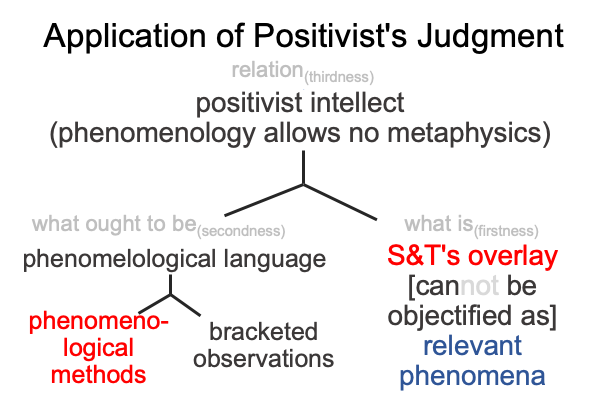0216 In Part III of their book, the authors dance through a philosophical critique without Peircean tools to depict triadic relations.
Uh oh. Without figures, is this critique philosophical or scientific or phenomenological?
0217 Here is the bottom line.
There is a method to the madness of the phenomenologists.
This is why Catholic philosophers long to engage in discourse with phenomenologists, even as phenomenologists reject discourse, on the um… grounds… that phenomenology follows the mandate of the positivist intellect. Metaphysics is not allowed.
0218 Catholic philosophers see that there is a method to phenomenology that can be articulated (somehow) by scholastic tradition (following Aquinas, not Poinsot). But, they do not appreciate how phenomenology is historically embedded in the modern Age of Ideas. Also, they do not appreciate what the scholastic tradition has achieved. John Poinsot writes in the 1600s and Thomas Aquinas writes in the 1200s. Poinsot figures out that signs are triadic relations. Aquinas mentions signs as things that signify other other things.
Razie Mah opens the lid to this can of worms in the series, Phenomenology and the Positivist Intellect (articles available at smashwords and other e-book venues).
0219 Yes, there is a method to the madness of the phenomenologists.
Phenomenologists intuitively generate (through their prescribed methods) noumenal overlays that coincide with semiotic agency, as articulated by Sharov and Tonnessen.
0220 What does this imply?
Sharov and Tonnessen’s formulation of semiotic agency, as a noumenal overlay, allows the inquirer to consider the prescribed methods of phenomenology as ways for examining natural and social phenomena arising from… the noumenal overlay of semiotic agency.

0221 Am I saying that phenomenological determinations of what the noumenon must be are really models that phenomenologists triumphantly overlay upon S&T’s noumenon?
I suppose… if what I say is correct… then biosemiotics is a science that belongs to a new age of understanding.
What age is that?
John Deely (1942-2017) thought long and hard about the proper label.
How about The Age of Triadic Relations?
